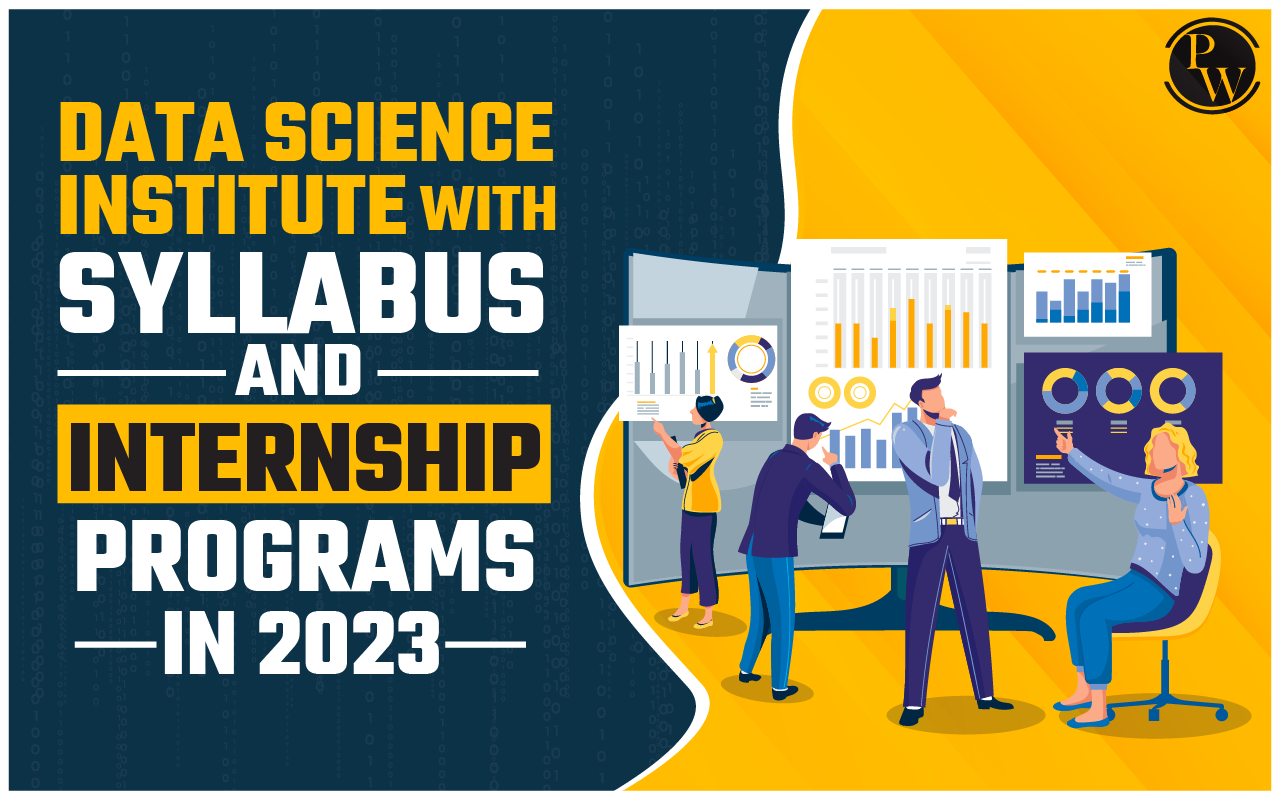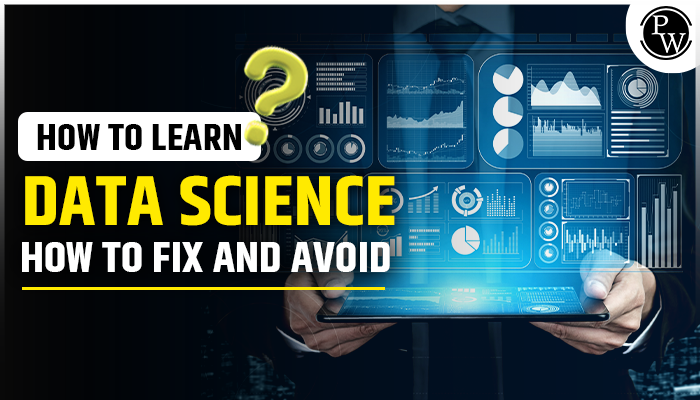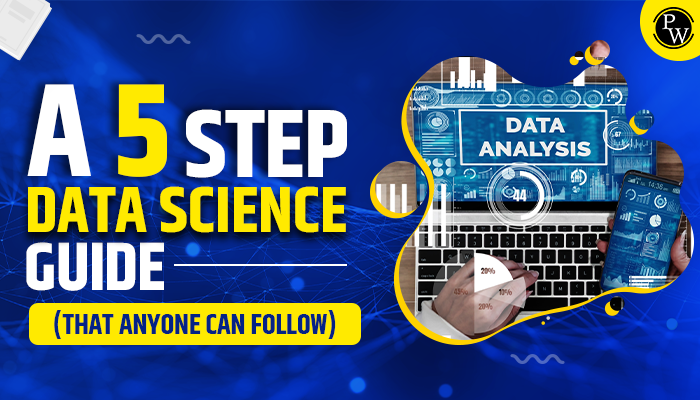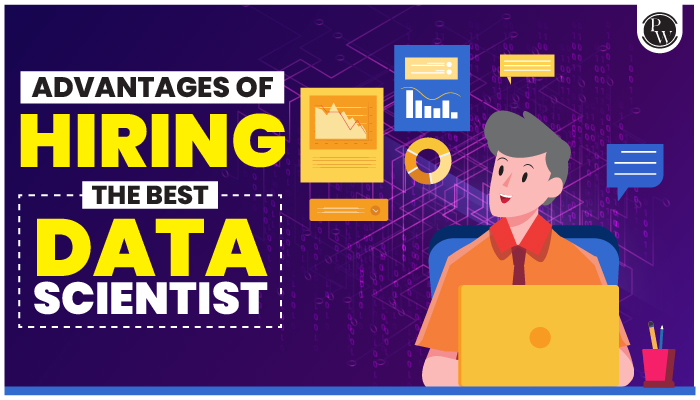Finding the best data science institute that offers a thorough curriculum and internship programs is crucial because of the rising need for employees with data science skills. Data science has emerged as a critical discipline in today’s technologically advanced society. One must work with huge and complex data sets to gain insights and make wise judgments. Healthcare, finance, marketing, and entertainment are just a few of the sectors that data science is altering.
In this post, we’ll go over the value of data science, things to keep in mind when selecting a college, what to expect from a data science school syllabus, and how internship programs can help you launch a successful data science career. Data science also assists businesses in fostering innovation, bettering client experiences, and operating more efficiently.
What is Data Science?
Data science students acquire comprehensive knowledge and skills in handling diverse data and statistical information types. The data science course syllabus is carefully crafted to provide students with a deep understanding of various techniques, tools, methodologies, and resources necessary for effective data management in a corporate setting.
The data science course syllabus offer specialized training in statistics, programming, algorithms, and other analytical disciplines. By developing these abilities, students can find solutions and make informed decisions.
The data science program equips students to excel in various data science job roles and positions, making them highly desirable candidates for top-tier companies. With their proficiency in working with different aspects of data science, students are well-prepared to secure employment opportunities in the industry.
Recommended Course
- Decode Data Science with ML 1.0
- Decode Full Stack Web Dev 1.0
- Decode JAVA with DSA 1.0
- System Design
Data Science Course Syllabus: Overview
A comprehensive data science course syllabus covers various topics to equip students with the necessary skills and knowledge. The data science course syllabus should include core concepts and algorithms, machine learning and deep learning techniques, data visualization and analysis, and big data technologies. By covering these areas in the data science course syllabus, students gain a solid foundation and understanding of data science’s fundamental principles and tools.
Also read: Unveiling the Data Science Syllabus, Topics, and Overview
Data Science Course Syllabus 2023
| Introduction to Data Science | Programming Languages |
| Machine Learning Algorithms | Artificial Intelligence |
| Data Analysis | Statistics |
| Big Data | Data Visualization |
Data Science Course Syllabus: Course-Wise
These are the top data science courses available after completing the 12th grade: BSc Data Science, MSc Data Science, BTech Data Science, MTech Data Science, and more. The following sections provide a detailed discussion of the data science course syllabus.
BSc Data Science Syllabus
The BSc Data Science course is divided into six semesters, each with a different syllabus. The subjects covered include Artificial Intelligence, Applied Statistics, Cloud Computing, and elective subjects. The main topics covered in the BSc Data Science course syllabus are listed below.
- Linear Algebra
- Probability and Inferential Statistics
- Basic Statistics
- Discrete Mathematics
- Programming in C
- Data Structures and Program Design in C
- Object-Oriented Programming in Java
- Machine Learning
- Database Management Systems
- Cloud Computing
- Big Data Analytics
- Data Visualization
B.Tech Artificial Intelligence and Data Science Syllabus
The BTech Artificial Intelligence and Data Science course syllabus covers various topics related to these fields. The main topics covered in the Data Science course syllabus are mentioned below.
| B.Tech Artificial Intelligence and Data Science Semester-1 | |
| Sr. No. | Subjects to Study |
| 1 | Computer Organization and Architecture |
| 2 | Ethics in Information Technology |
| 3 | Mathematical Foundations of Computing |
| 4 | Programming for Problem-Solving |
| B.Tech Artificial Intelligence and Data Science Semester-2 | |
| 1 | Calculus, Vector Spaces, and Laplace Transform |
| 2 | Concepts of Entrepreneurship |
| 3 | Digital System Design |
| 4 | Internet of Things |
| 5 | Microprocessor and Microcontroller |
| 6 | Python Programming |
| 7 | Practical’s
|
| B.Tech Artificial Intelligence and Data Science Semester-3 | |
| 1 | Data Structures and Algorithms |
| 2 | Entrepreneurship and Product Development |
| 3 | Object-Oriented Programming |
| 4 | Partial Differential Equations, Probability, and Statistics |
| 5 | Software Engineering |
| B.Tech Artificial Intelligence and Data Science Semester-4 | |
| 1 | Computer Networks |
| 2 | Discrete Structure |
| 3 | Design and Analysis of Algorithms |
| 4 | Operating Systems |
| 5 | Mini Project / Summer Internship-I |
| B.Tech Artificial Intelligence and Data Science Semester-5 | |
| 1 | Database Management System |
| 2 | Introduction to Data Science |
| 3 | Optimization Methodologies |
| 4 | Theory of Computation |
| 5 | Web Technology |
| B.Tech Artificial Intelligence and Data Science Semester-6 | |
| 1 | Distributed Computing |
| 2 | Embedded Systems |
| 3 | Machine Learning Techniques |
| 4 | System Software and Compiler Design |
| 5 | Mini Project / Summer Internship – II |
| B.Tech Artificial Intelligence and Data Science Semester-7 | |
| 1 | Cryptography and Network Security |
| B.Tech Artificial Intelligence and Data Science Semester-8 | |
| 1 | Core Product Development |
PW Skills Provide Various Platform
Also read: Best Tips To Prepare For A Data Science Career In 2024
B Tech Data Science Syllabus
The BTech Data Science course is a four-year undergraduate program with eight semesters and six program electives. The main topics covered in the BTech Data Science course syllabus are mentioned below.
B Tech Data Science helps students to excel in Computer Science and Engineering education, research, and project management by empowering the students with strong conceptual knowledge.
| Semester 1 | Semester 2 |
| Professional English and Soft Skills /Engineering Graphics and Computer-Aided Design | Analytical Mathematics |
| Matrices and Calculus | Engineering Physics/ Engineering Materials |
| Engineering Physics/Engineering Materials | Professional English and Soft Skills /Engineering Graphics and Computer-Aided Design |
| Problem-Solving Using C | Introduction to Digital Systems / Engineering and Design |
| Introduction to Digital Systems / Engineering and Design | Sustainable Engineering Systems |
| Engineering Immersion Lab | Data Structures |
| Engineering Physics Lab/ Materials Chemistry Lab | Python for Data Science |
| – | Engineering Immersion Lab |
| – | Engineering Physics Lab/ Materials Chemistry Lab |
| Semester 3 | Semester 4 |
| Applied Linear Algebra | Discrete Mathematics |
| Design and Analysis of Algorithms | Digital Marketing Analytics |
| Database Management Systems | Data Wrangling |
| Java Programming | Data Handling and Visualization |
| R for Data Science | Department Elective-II |
| Department Elective-I | Non-Department Elective–II |
| Non-Department Elective- I | Data Wrangling Lab |
| Database Management Systems Lab | Data Handling and Visualization lab |
| – | Design Project-I |
| – | Internship |
| Semester 5 | Semester 6 |
| Probability and Statistics | Software Project Management |
| Business Intelligence and Analytics | Machine Learning |
| Predictive Modeling and Analytics | Data Warehousing and Data Mining |
| Artificial Intelligence | Modern Software Engineering |
| Professional Ethics and Life Skills | Business Economics |
| Department Elective-III | Department Elective-IV |
| Non-Department Elective–III | Non-Department Elective–IV |
| Business Intelligence and Analytics Lab | Data Mining Tools Lab |
| Design Project with IoT | – |
| Semester 7 | Semester 8 |
| Text Analytics and Natural Language Processing | Project & Viva – voce |
| Big Data and Analytics | – |
| Time series analysis and Forecasting | – |
| Deep Learning | – |
| Department Elective–V | – |
| Non-Department Elective-V | – |
| Real-time Case Study Lab | – |
| Design Project-III | – |
BCA Data Science Syllabus
The BCA Data Science course is a three-year undergraduate program with six semesters. The Data Science course syllabus focuses on advanced knowledge of Data Science and software applications. The main topics covered in the BCA Data Science course syllabus are mentioned below.
| Semester 1 | Semester 2 | Semester 3 |
| Cultural Education 1 | Cultural Education 2 | Life Skills 1 |
| Communicative English | Language Paper 2 | Essential of Data Collection Ethics |
| Language 1 | Professional Communication | Descriptive Statistics |
| Discrete Mathematics | Statistics and Probability | Computer Networks |
| Environmental Science and Sustainability | Database Management System | Object Oriented Programming using C++ |
| Computer Essentials for Data Science | Data Structure and Algorithm | Software Engineering |
| Computational Thinking and Programming in C | Operating System | Scripting Technologies Lab |
| Computational Thinking and Programming in C Lab | Database Management System Lab | Practical Exposure to Data Collection Lab |
| – | Data Structures Lab | – |
Also read: Linear Search Algorithm in C, Data Structure and Tutorials
| Semester 4 | Semester 5 | Semester 6 |
| Life Skills 2 | Data Modelling and Visualization | Big Data Analytics |
| Introduction to Data Mining | R Programming for Data Sciences | Information and Data Security |
| Python Programming | Machine Learning | Natural Language Processing |
| Open Elective A* | Elective B | Elective C |
| Introduction to Java and
Web Programming |
Introduction to Parallel Programming and Data Optimization | Big Data Analytics Lab |
| Python Programming Lab | Open Elective B* | Project |
| Elective A | Introduction to Parallel Programming Lab | – |
| Java Programming Lab | Fundamentals of Machine Learning Lab | – |
| – | Minor Project | – |
MSc Data Science Course Syllabus
The MSc Data Science course is a two-year postgraduate program. The Data Science course syllabus focuses on subjects such as Calculus, Descriptive Statistics, C Programming, and various technologies, including Machine Learning, Deep Learning, Python, and Spark. The main topics covered in the MSc Data Science course syllabus are mentioned below.
| Semester I | Semester II |
| Mathematical Foundation For Data Science | Mathematical Foundation For Data Science – II |
| Probability And Distribution Theory | Regression Analysis |
| Principles of Data Science | Design and Analysis of Algorithms |
| Fundamentals of Data Science | Machine learning |
| Python Programming | Advanced Python Programming for Spatial Analytics |
| Introduction to Geospatial Technology | Image Analytics |
| Semester III | Semester IV |
| Spatial Modeling | Industry Project |
| Summer Project | Research Work |
| Genomics | Research Publication |
| Natural Language Processing | Exploratory Data Analysis |
Data Science Institute and Internship Programs
It is designed for individuals with a solid understanding of the fundamentals and does not require a review of the basics.
The instructor guides you through Jupyter Notebook workbooks throughout the course to enhance your understanding and mastery. The topics covered include utilizing Python for Data Science and Machine Learning, Random Forest and Decision Trees, Big Data Analysis, Support Vector Machines, Neural Networks, Natural Language Processing, Spam Filters, and more.
Curriculum Covered:
- Python Crash Course
- Numpy and Pandas – Python libraries for Data Analysis
- Matplotlib, Seaborn, Plotly, Cufflinks, and Geographic plotting – are used for data visualization.
- Regression, KNN, Trees and Forests, SVM, K-Means Clustering, PCA – used for Machine Learning
- Natural Language Processing
- Big Data and Spark
- Neural Nets and Deep Learning
Also read: Future of Data Science: Trends to Watch in 2025
FAQs
Can I pursue a data science course without any prior programming experience?
Many data science institutes offer courses suitable for beginners with no programming experience. These courses usually cover programming fundamentals and gradually progress to advanced topics in data science.
How long does it typically take to complete a data science course?
The duration of data science courses can vary depending on the institute and the program level. Short-term courses may range from a few weeks to a few months, while comprehensive programs can extend to one or two years.
Are there any specific prerequisites for enrolling in a data science course?
Prerequisites can vary, but a strong foundation in mathematics and statistics is often recommended. Basic knowledge of programming languages like Python or R can also be beneficial.
Will I receive a certificate upon completion of a data science course?
Most reputable data science institutes provide certificates upon successful completion of their programs. These certificates can add value to your resume and validate your skills to potential employers.
How can I evaluate the quality of internship programs offered by data science institutes?
To evaluate the quality of data science internship programs, consider factors such as the internship duration, the nature of projects offered, industry partnerships, and alumni feedback. Candidates must inquire about the support and guidance provided during the internship period.







Thanks to PW for always empowering us with useful content on data science that guides our data scientist journey. 📊🔍 #DataScience #EducationEmpowerment
A big thank you to PW for consistently empowering us with their insightful content. 📈💼 #DataScienceInstitute #ThanksPW